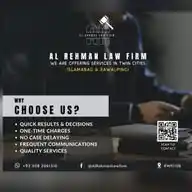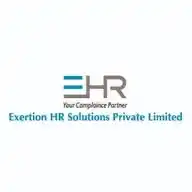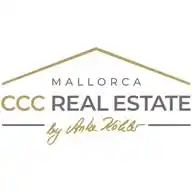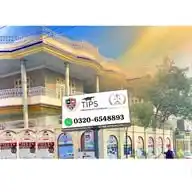
Al Rehman Law Firm — Legal Consultant
6 subscribers
About Al Rehman Law Firm — Legal Consultant
Welcome to Al Rehman Law Firm! Your trusted WhatsApp channel for all things legal—simplified, reliable, and to the point. What We Cover: We’ve got you covered across the entire legal spectrum: - Civil Law: Property, contracts, family disputes (marriage, divorce, inheritance, custody), and more. - Criminal Law: Arrests, bail, trials, and your rights explained. - Corporate Law: Business setup, compliance, trademarks, and taxation. - Consumer Law: Fraud, refunds, and product disputes. - Employment Law: Job contracts, harassment, salary issues, and termination rights. - Constitutional Law: Fundamental rights and legal protections. - Real Estate Law: Buying, selling, leasing, and tenancy disputes. - Intellectual Property: Patents, copyrights, and creative rights. - Personal Legal Needs: Wills, trusts, power of attorney, and more. - Plus, emerging areas like cyber law, environmental law, and international regulations! What You’ll Get: - Easy-to-understand legal insights. - Updates on laws, cases, and reforms. - Practical tips for everyday legal situations. - Resources and guidance for businesses and individuals alike. Who We Are: Al Rehman Law Firm—dedicated legal experts bringing clarity to the law for everyone. Disclaimer: This channel offers general legal information, not tailored advice. For personal cases, consult a lawyer directly. How to Engage: - Follow for regular updates. - Drop your legal questions or topics you want us to cover! Empowering you with knowledge—stay informed with Al Rehman Law Firm!
Similar Channels
Swipe to see more
Posts

2023 CLC 713 Power of court to receive document any evidence at subsequent stage---Scope and principle---De-exhibiting of document ---If a party relied upon a document , he should have filed the document s with the plaint, and if he relied upon on any other document s, whether or not in his possession or power, as evidence in support of his claim then such document s were required to be entered in a list to be added or annexed to the plaint as provided in R.14 of O.VII of the C.P.C---Otherwise party should have produced all the document ary evidence of every description in his possession or power at the first hearing of the suit on which he intended to rely as required under O.XIII, R.1 of the C.P.C---As far as non-filing of document s along with the plaint or at the first hearing of the suit, it had never been considered fatal in view of provision of the O.XIII, R.2 of the C.P.C which empowered the Court to receive document ary evidence at subsequent stage of trial---No document ary evidence in possession or powers of any party which could have been but had not been produced in accordance with the requirements of R.1 of O.XIII of the C.P.C could be received at any stage of the proceedings unless good cause was shown to the satisfaction of the Court for non- production thereof and the Court receiving any such evidence could record the reasons for doing so---Object of O.XIII R.2 of the C.P.C was not to penalize the parties for not producing the document s in time but to provide opportunity to produce evidence which party for some good cause could not produce well within time---Evidence could not be shut-out to exclude the document s generally except where they were apparently suspicious, forged or fabricated , so as to prevent the fraud---Two relevant stages relating to bringing the document s on record were; first stage was to produce or file a document at the time of filing of the plaint and the second when it was tendered in evidence---Discretion was, therefore, vested in the Trial Court to extend the time for producing document s even after the first hearing; there was also no requirement for filing a formal application so as to seek leave of the Court in order to produce a document ---Expression of de-exhibit was not defined nor mentioned in the C.P.C, although R.3 of O.XIII of the C.P.C empowered the Court that it could reject irrelevant or inadmissible document s but it was not the intention of legislation to remove the document s from the record after they had been received and marked as exhibit---Party filing the document was entitled to receive it back as provided under O.XIII, R.4, C.P.C.---Provision of O.XIII, R.4 of the C.P.C was mandatory and if not complied with, the document could not be considered in evidence. Judicial proceeding--Presumption of due course and correctness---List of document s relied upon---Predecessor of petitioners filed suit for declaration before Trial Court---Respondents contested the suit through written statement---Respondents moved an application for rejection/de-exhibit of document s produced by petitioners---Trial Court accepted the application and de-exhibited the document s---Predecessor of the petitioners filed civil revision before Appellate Court---Appellate Court dismissed the civil revision of predecessor of petitioners---Held, that counsel for the predecessor of the petitioners produced document ary evidence in presence of counsel for respondents, which was got exhibited---Presence of counsels for the parties was marked by the Trial Court---No affidavit of counsel for the respondents was available to the effect that on the fateful date ,he was not present at the time of producing the document ary evidence from the petitioner's side---Presumption of due course and correctness was attached to the proceedings of the Court which was official record---Such presumption was rebuttable, but vague and meager evidence could not rebut such presumption---Strong and un impeachable evidence would be needed to rebut such presumption ---Giving preference to mere bald assertions or affidavit over judicial proceedings recorded by a Presiding Officer, if adopted, would lead to a large number of complications---In case in hand, it was evident from perusal of list of relied document s that predecessor of the petitioners relied upon certified copies of record of rights from the year 1946-47 to 1985-86 certified copy of record of right for the year 1993-94 and some other important document s---Meaning thereby, the predecessor of the petitioners had relied upon the document s---Constitutional petition was allowed, impugned judgments/orders of Trial Court and Appellate Court were set aside and document s produced by predecessor of the petitioners were deemed to be the part of the record with the direction that respondents/defendants were at liberty to rebut these document s by producing evidence on their turn. Exhibition of document ---Public document s---Waiver of objection---Courts were vested with authority and jurisdiction to ascertain the genuineness and authenticity of any document in order to arrive at just and fair conclusion---Respondents/defendants in the present case failed to raise any objection before the Trial Court at the time of exhibition of document s---document s having been marked as exhibited became admissible in evidence---When a document had been exhibited in evidence without any objection and was allowed to be brought on record by the Court the same could be deemed as proved in all respect---Party not objecting for production of such document s in Court would be presumed to have waived such objection---Court was not prevented from adjudicating the nature of document whether it was valid or not, whether document was fake or not---Admittedly, document s produced by predecessor of the petitioners were certified copies of the revenue record which fell within the scope of the expression "Public document s" and mere non-mentioning of said document s i non the list of relied document s could not be ground for de-exhibiting said documents

*FBR Issues Guidelines for Tax Recovery via Property Auctions* According to the FBR, the procedure involves several key steps: 1. *Issuance of Notice:* The first step involves the Commissioner of Inland Revenue issuing a formal notice to the taxpayer in a prescribed form, requesting payment of the overdue tax within a specified period. This is a crucial opportunity for taxpayers to settle their dues before further action is taken. 2. *Modes of Recovery:* If the taxpayer fails to comply with the notice within the given timeframe, or if an extension is not granted by the Commissioner, authorities may proceed with one or more of the following recovery methods: (I) *Attachment and Sale of Property:* The taxpayer’s movable or immovable property may be seized and auctioned off to recover the outstanding amount. (II) *Appointment of a Receiver:* A receiver may be appointed to manage the taxpayer’s property, with any profits from the property used to clear the tax debt. (III) *Arrest and Detention:* In extreme cases, the taxpayer may be arrested and detained for a period not exceeding six months. (IV) *Other Modes:* Additional measures such as those listed in Section 48 of the Sales Tax Act, 1990, may also be employed to recover the tax. 3. *Legal Authority:* For enforcement, the Commissioner holds the same authority as a Civil Court under the Code of Civil Procedure, 1908. This grants tax officials substantial legal power to recover overdue amounts through property seizures and other court-backed measures. 4. *Rules and Regulations:* The FBR retains the right to create and update rules to govern the detailed procedures involved in these recovery actions, ensuring that all processes comply with the law while remaining efficient and effective.

رضامندی سے جاری ڈگری کے آٹھ استثناء ایسے ہیں جہاں اپیل ممکن ہںے۔ *Consent Decree* 1.) ایسا شخص اپیل کرے جو فریق مقدمہ نہ تھا۔ 2007 MLD 331. 2.) ڈگری رضامندی سے نہ ہںوئی۔ 1994 CLC 54 3.) عدالت کو سماعت کا اختیار نہ تھا۔ 1986 SCMR 419 4.) جہاں پر راضی نامہ کی نوعیت کا تنازعہ تھا۔ 1977 SCMR 586 5.) جہاں پر ڈگری معاہدہ کی حدود سے باہر تھی۔ 1976 SCMR 519 6.) جہاں پر رضامندی حقائق کی غلطی کی وجہ سے تھی۔ (فراڈ) 1993 MLD 640 7.) جہاں پر راضی نامہ ممکن نہ تھا۔ 1994 CLC 54 8.) جہاں پر حکم 23 رول 3 پر اس کی روح کے مطابق عمل نہ کیا گیا ہںو۔ 1989 SCMR 1752.

*✅ Limitation Period* 1. The time for filing first appeal in civil cases is 30 days. 2. The time for filing second appeal in civil cases is 60 days. 3. The time for filing civil revision is 90 days. 4. Limitation period of appeal in capital punishment, 7 days. 5. Limitation period of appeal From Magistrate to Sessions Court, 30 days. 6. Limitation period of appeal From Sessions Court to High Court, 60 days. 7. Limitation period of appeal From High Court to Supreme Court, 30 days. 8. Limitation period of appeal From High Court to Supreme Court in special Leave to Appeal, 30 days. 9. Limitation period of appeal From Magistrate to High Court in acquittal in Challan Case is 30 days and in Complaint Case 60 days. 10. Limitation period of appeal From Sessions Court to High Court in acquittal in Challan Case is 30 days and in Complaint Case 60 days. 11. Limitation period of appeal From High Court when case decide by it in its original jurisdiction and to Division Bench than 20 days in acquittal or conviction as the case may. 12. Plaintiff has a time of 6 years to file execution. 13. Limitation in civil suits is 3 years from the cause of action. 14. Article 150. Appeal from death sentence to High Court-7 days. 15. Article 151. High Court order on original side-appeal-20 days. 16. Article 154. Appeal to any Court other than High Court-30 days. 17. Article 155. Criminal appeal to High Court-60 days. 18. Article 157. Appeal from acquittal by State-6 months.













